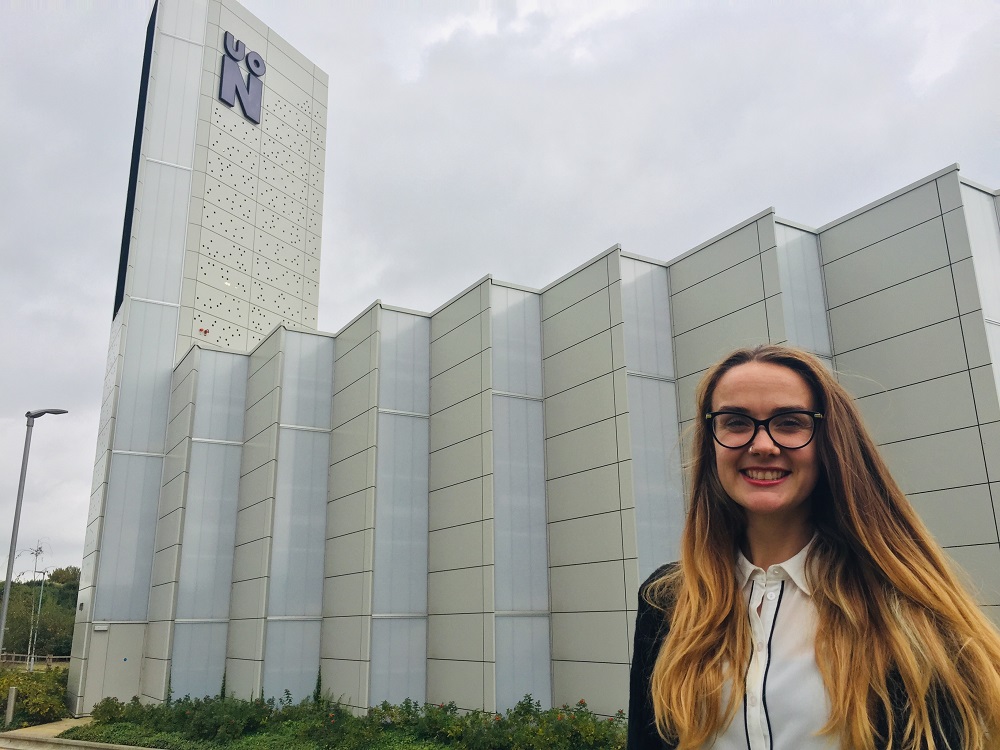BLOG: I changed career to fight for the environment
Date 5.11.2021

This week is the 26th United Nations Climate Change Conference (COP26), in Glasgow.
To mark the occasion, the University of Northampton is hosting a COP26 companion programme of events throughout the week, which will see students, University staff and industry discuss climate change.
Each day we will be publishing a blog about climate change from our experts who are taking part in our event.
Today (Friday 5 November), it’s the turn of the University’s Energy Officer, Danielle Bird, who explains why she switched careers to help save the planet.
I changed career to fight for the environment
In 2017, I gave up a career in project management in the events sector and made the decision to return to education in the hope of starting an entirely new career related to the environment. I had always loved nature, being outdoors, even things like cloud spotting – and I longed to learn more about it. The more I learnt about the environment, the more I realised that we needed to do more to protect it and I could, in some way, help to address serious problems such as air quality and climate change. Enrolling at the University of Northampton to study Environmental Science was a big step, but I had already spent 10 years feeling disconnected in my work, so, why not give it a go?
Whilst it was daunting (sat in a class of school leavers and not having studied or written an essay in a decade), it was also brilliant. I could not believe just how broad the subject was and how studying the various modules, from waste management, to ecology to meteorology, was so interesting. Throughout the degree, I was often shocked as I learnt more about the impacts of climate change and unsustainable resource management. This made me more determined to study harder and get the results that would help me start this new career which I now knew was more important than ever.
Fast forward three years, my degree complete (albeit during a global pandemic), I am fortunate to be working as the Energy Officer at the University. It has been an incredible start into my new career. During my first year, the University submitted and achieved fantastic rankings for the UN Sustainable Development Goals and committed to being Net Zero Carbon by 2030. I am so proud to be involved with, and support the efforts, in making these achievements become a reality. As the Energy Officer, the pledge to Net Zero Carbon in Scope 1 & 2 emissions is a target which I will be working on with the wider team as these emissions are generated from energy production and use. Globally, the whole energy sector is the biggest contributor to greenhouse gas emissions, accounting for approximately 73% as per the most recent data in 2016 (Ritchie, 2020).
First and foremost, reduction in energy use and demand is key. This is a goal I continue to work on and hope to achieve through close monitoring, data management and engagement with staff and students. This is one example of the ways my role can help to improve the environment. If we can reduce our energy demand, we reduce the carbon emissions that contribute to climate change.
Awareness of climate change has increased significantly over recent years. Most notable since the school strikes initiated by Greta Thunberg in 2018. This has sparked debate about the younger ‘green generation’ vs the older generation, “Young people must hold older generations accountable…”. Personally, I feel that we all have a responsibility to tackle climate change, no matter how old we are. Climate change is a global problem, but not only should there be unity between countries and government, we need to come together and not blame each other. I strongly feel it is down to all of us to make a difference, big or small, if we are really going to help improve the environment. Previous societies burnt more fossil fuel because they were cheap, abundant and they hadn’t yet heard of climate change. We now have full access to the science and evidence that this is a serious issue that is of our creation. It is not about old versus young, but about the choices and actions we all make now. We cannot change the past. Education is an important step that we can take. It certainly helped me to improve my lifestyle choices and understand how I can personally have less impact on the environment. Sure, it may not solve it, but if everybody did something, it would all add up.
Climate Change is not going to go away. According to the latest report by the United Nations ‘The Production Gap’ we are still not on target to reach the 1.5 degree warming limit as agreed in Paris, 2015. There is much work that needs to be done now and, in the future, much of which concerns energy generation and use and renewable technologies. The need for world-wide graduates with knowledge and skills in this topic is vital for the future and how we can work towards building a more sustainable way of living. The new Climate Change degree at UON demonstrates positive and forward thinking action. We need future climate scientists, researchers, policy makers who have a greater understanding of the impacts of national and international decisions relating to climate change. This is also open to all ages and it is never too late to make a difference.